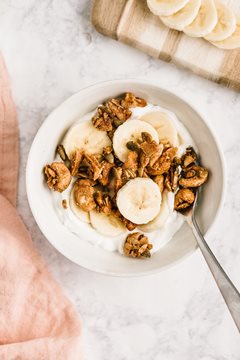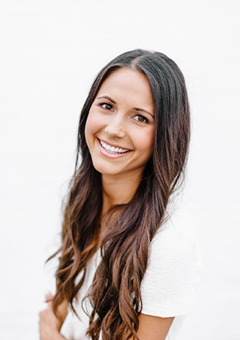We're so excited to be bringing you our newest series: Ask an RD. Each month, we'll be asking you what kind of health and wellness questions you have and we'll go straight to the professionals for answers. We'll be working with a group of Registered Dietitians each month to bring you answers to all of your burning questions. First up,
Jessica Bippen of Nourished by Nutrition will be answering one of the questions we got asked a few times in September.
Are there nutrients I could be missing on a grain-free diet?

Anytime you cut out main food groups from your diet, there’s a possibility to miss out on specific nutrients. Whether your
dairy-free,
vegan, grain-free or have specific restrictions like nuts or seafood due to allergies, you may need to pay a little extra attention to the food you’re eating to ensure you’re getting the necessary nutrients you need on a daily basis. The good news? You can get all the nutrients you need no matter what foods you choose to include or not (in this case grains!).
But before we dive into the specifics, just a reminder that carbohydrates are a key component to a healthy and varied diet. Grains, especially whole grains, have many benefits including fiber, vitamins and minerals, antioxidants, and provide energy. That being said, some individuals find a grain-free diet helps them feel their best. In addition, some research supports a grain-free diet in the form of the
Autoimmune Protocol Diet can help those with autoimmune conditions. However, it’s always best to talk with your doctor.
If you're someone who chooses to follow a grain-free diet, you may need to pay closer attention to these nutrients:
- Fiber
- B-vitamins
- Iron
- Magnesium
- Phosphorus
- Zinc
Since whole grains contain a concentrated source of many of these nutrients, it’s important to make sure you are eating other foods rich in those specific vitamins and minerals. Luckily other non-grain foods contain many of these nutrients. Try incorporating more of these foods into your diet:
- Fiber: veggies, fruits, beans, legumes, nuts, and seeds.
- B-vitamins: beef, turkey, eggs, legumes, dark leafy greens, nutritional yeast, and almonds.
- Iron: aminal proteins like liver, red meat, poultry, fish, or plant-based sources like spinach, nuts, seeds, and legumes.
- Magnesium: nuts and seeds like pumpkin seeds, almonds, cashews, and peanuts, as well as spinach.
- Phosphorus: chicken, turkey, seafood, dairy, pumpkin seeds, sunflower seeds, cashews, pistachios, and legumes.
- Zinc: oysters, beef, chicken, tofu, pork, nuts, seeds, lentils, yogurt, and mushrooms.
As a Registered Dietitian, I fully support a
food first approach to nutrients. However, if you find it hard to incorporate these foods that are good sources of nutrients abundantly found in grains, you may consider taking a multivitamin. Think of it as an insurance policy for your daily dose of vitamins and minerals! While still focusing on a well-rounded diet, a multivitamin can give you peace of mind that you’re still getting the nutrients you need.
 Jessica Bippen, MS, RD, founder of Nourished by Nutrition.
Jessica Bippen, MS, RD, founder of Nourished by Nutrition.
She believes in a forever approach to living well by helping others understand the science behind nutrition and wellness while tailoring it to their unique body and lifestyle. She's the author of Collagen: Self-Care Secrets to Eat, Drink, and Glow and is frequently featured in media outlets including HUM Nutrition, Well+Good, Free People, and Tammy Hembrow Fitness.
Follow along with Nourished by Nutrition on Instagram for more tips, recipes, and wellness inspiration.